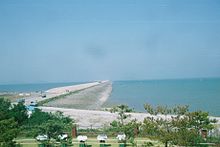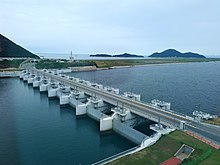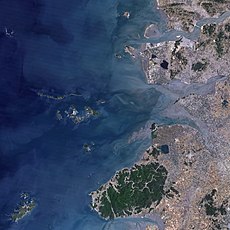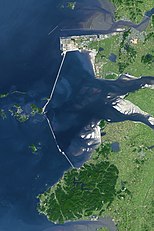Saemangeum (Korean pronunciation: [sɛmanɡɯm]) is an estuarine tidal flat on the coast of the Yellow Sea in South Korea. It was dammed by the government of South Korea's Saemangeum Seawall Project, completed in 2006, after a long fight between the government and environmental activists, and is scheduled to be converted into either agricultural or industrial land. Prior to 2010, it had played an important role as a habitat for migratory birds.
| Saemangeum | |
| Hangul | 새만금 |
|---|---|
| Hanja | 새萬金 |
| Revised Romanization | Saemangeum |
| McCune–Reischauer | Saeman'gŭm |


Impact
editThe completion of this seawall is likely to be a major contributor to the decline of many species. Around 400,000 shorebirds depended on the Saemangeum estuary mudflats as an important feeding ground on the 24,000 km migration between Asia and Alaska and Russia,[2] including the two endangered waders Nordmann's greenshank and spoon-billed sandpiper (each species with fewer than a thousand surviving birds).[3] A conservation organisation has accused authorities of having failed to monitor the project's impact on local wildlife in a transparent way, and carried out an independent monitoring program in 2006.[citation needed]
History
editThe Saemangeum lies at the mouths of the Dongjin and Mangyeong Rivers, on the coast of Jeollabuk-do. It is just south of the estuary of the Geum River. Neighboring districts include Gunsan City, Buan County, and Gimje City.
The project of filling in the estuary began in 1991, but was slowed by a series of court actions by environmentalists. The completed seawall is some 33 kilometers long, and replaces a coastline that was once more than 100 kilometers long. After the estuary has been completely filled, an area of about 400 km2 (roughly two-thirds the size of Seoul) will have been added to the Korean peninsula, making it one of the biggest land reclamation projects in history.[4]
The estuary was originally called "Mangeum" (萬金). This name was probably formed from combining the first character of "Mangyeong" and that of "Gimje."[5]
Saemangeum was completed on April 27, 2010, officially becoming the longest seawall ever built with the length of 33.9 km, breaking the record of Zuiderzee Works from 1932.[6]
On August 2, 2010, Saemangeum was certified by Guinness World Records as the longest man-made sea barrier in the world.[7]
Saemangeum was the venue of the 25th World Scout Jamboree, hosted by the Korea Scout Association.[8]
See also
editReferences
edit- ^ "Changes to the Saemangeum Estuary, South Korea". earthobservatory.nasa. May 17, 2007. Retrieved November 22, 2023.
- ^ "Birds Korea - Saemangeum - Mainpage". www.birdskorea.org. Retrieved January 28, 2008.
- ^ "Birds 'starve' at S Korea wetland". BBC News. May 12, 2007. Archived from the original on May 27, 2012. Retrieved May 23, 2010.
- ^ "Massive Seawall on Korea's Coast Completed". Chosun.com. April 21, 2006. Archived from the original on May 13, 2006. Retrieved April 21, 2007.
- ^ "대항리(大項里) : 전라북도 부안군 변산면, 대각산(大角山) : 군산시 옥도면 신시도리" [Daegang-ri (大項里): Byeonsan-myeon, Buan-gun, Jeollabuk-do, Daegaksan (大角山): Sinsi-dori, Okdo-myeon, Gunsan-si]. Korea Landportal. June 2003. Archived from the original on November 25, 2004. Retrieved May 6, 2006.
- ^ "세계최장 33.9 km... 새만금방조제 달려보니" [The world's longest 33.9 km... I ran the Saemangeum seawall]. Seoul.co.kr (in Korean). April 28, 2010. Retrieved April 30, 2010.
- ^ "(LEAD) Guinness certifies Saemangeum as world's longest seawall". Yonhap News Agency. Archived from the original on March 26, 2012. Retrieved August 2, 2010.
- ^ "sae man guem, korea 2023" (in Korean). Archived from the original on August 14, 2017. Retrieved July 25, 2017.
Further reading
editMoores, N.; Battley, P.; Rogers, D.; Park M-N; Sung H-C; Van de Kam, J.; & Gosbell, K. (2006). Birds Korea – AWSG Saemangeum Shorebird Monitoring Program Report, 2006. Birds Korea publication: Busan.
External links
edit- Korea's government official website : Saemangeum Development and Investment Agency
- Chosun Ilbo report on the completion of the seawall Archived May 13, 2006, at the Wayback Machine, 2006-04-21
- Saemangeum reference page from Birds Korea
- Korea Rural Community Corporation Saemangeum Website
- Article in New York Review of Books Mentions Saemangeum Seawall as prime example of bird habitat loss
- 「25th WorldScout Jamboree」 Official Site

